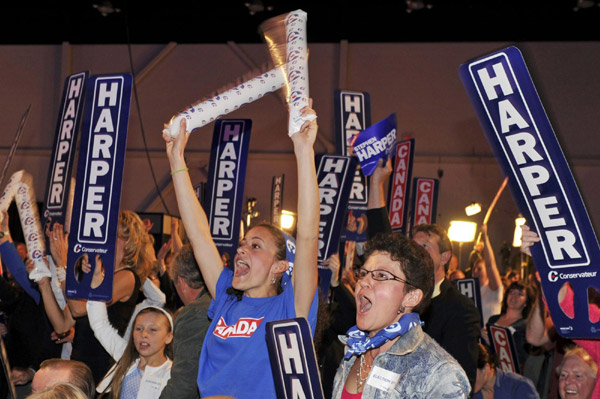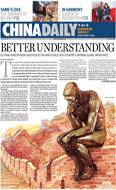Politics
Canada's Conservatives win majority
Updated: 2011-05-03 10:57
(Agencies)
|
|
TORONTO - Canada's Conservative Prime Minister Stephen Harper won his coveted majority government in elections Monday that also marked a shattering defeat for the opposition Liberals, preliminary results showed.
Harper, who took office in 2006, has won two elections but until now had never held a majority of Parliament's 308 seats, forcing him to rely on the opposition to pass legislation.
While Harper's hold on the 308-member Parliament has been tenuous during his five-year tenure, he has managed to nudge an instinctively center-left country to the right. He has gradually lowered sales and corporate taxes, avoided climate change legislation, promoted Arctic sovereignty, upped military spending and extended Canada's military mission in Afghanistan.
Elections Canada reported preliminary results on its website, giving the Conservatives 164 seats, which will give Harper four years of uninterrupted government.
"It's stunning. We're elated," Conservative lawmaker Jason Kenney said in an interview with CBC. "We'll be a government for all Canadians."
The leftist New Democratic Party was projected to become the main opposition party for the first time in Canadian history with 106 seats, in a stunning setback for the Liberals who have always been either in power or leading the opposition.
Former colleagues of Harper say his long-term goals are to shatter the image of the Liberals - the party of former Prime Ministers Jean Chretien, Lester Pearson and Pierre Trudeau - as the natural party of government in Canada, and to redefine what it means to be Canadian.
Harper, who comes from the conservative western province of Alberta, took a major step toward that goal on Monday night as the Liberals dropped to 35 seats from 77, according to the preliminary results.
Liberal leader Michael Ignatieff congratulated Harper and New Democrat leader Jack Layton and accepted responsibility for the "historic defeat."
"I will play any part that the party wishes me to play as we go forward to rebuild," said Ignatieff, who even lost his own seat in a Toronto suburb.
Stephen Clarkson, a professor of political science at the University of Toronto, said Harper will now be considered a transformative figure in Canadian history.
"It's a sea change," Clarkson said.
E-paper

Head on
Chinese household care goods producers eye big cities, once stronghold of multinational players
Carving out a spot
Back onto center stage
The Chinese recipe
Specials

British Royal Wedding
Full coverage of the royal wedding of Prince William and Kate Middleton in London. Best wishes

The final frontier
Xinjiang is a mysterious land of extremes that never falls to fascinate.

Bridging the gap
Tsinghua University attracts a cohort of foreign students wanting to come to China.

